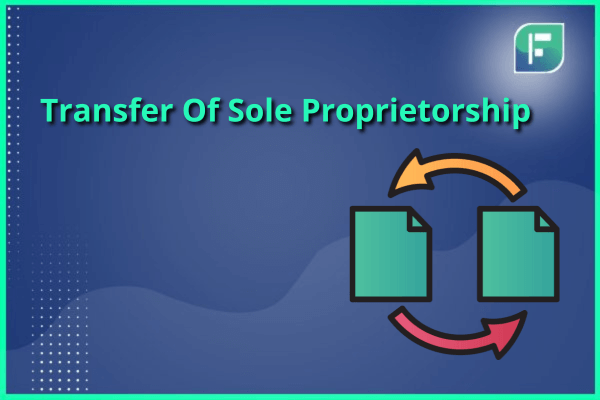A sole proprietorship is a singular entity within the business domain. It is where a sole individual assumes the role of the business leader. This individual not only does procurement and finalises transactions but also meticulously oversees the financial records. All accrued profits go directly into the proprietor’s coffers. Conversely, when confronted with downturns, the sole proprietor bears the full brunt of any losses. In essence, this individual functions as the principal architect and commander of the entire business operation. In this blog, we shall learn about the transfer of sole proprietorship in India.
Setting up a Sole Proprietorship
Establishing and overseeing a sole proprietorship is a pretty straightforward affair, without the need for navigating through legal complexities. In contrast to corporations, there’s no legal wall standing between the sole proprietorship and its owner.
If you want to undertake transfer of sole proprietorship, the owner needs to kickstart the process by transferring all the essential assets linked to the business.
Sale of Assets in a Sole Proprietorship
The sole proprietor possesses business assets in a manner similar to personal assets. Some assets may serve dual purposes, being used both for commercial and personal use. In the event of selling the business, the proprietor needs to identify and list the assets intended for transfer to the new owner, while retaining the rest for personal use.
Changing Business Name in a Sole Proprietorship
As a sole proprietor, one has the option to operate under their personal name or register an alternate “doing business as” name with the state government. If the new owner intends to continue using the same DBA, a change of ownership form may be required, depending on the state’s regulations. Some states may additionally mandate a public announcement of the change in a prominent newspaper. If the new owner opts for a different business name, the sole proprietor must file a DBA cancellation form.
Handling Pending Contracts in a Business Transfer
In the case of ongoing contracts held by the sole proprietor, the new owner is responsible for taking over and honouring these agreements. Legal assignment of contractual obligations to the new owner is advisable for a smooth business transition. It’s crucial to note that if any contract contains clauses preventing transfer, the consent of the involved parties, particularly customers, is necessary for the successful transfer or sale of the business.
Goodwill Transfer in Business Sales
Valuing and transferring goodwill, an intangible asset, can be challenging. If a sole proprietor wishes to include goodwill as part of the business sale, consulting with an expert like StartupFino is essential to determine a fair price. It’s important to recognise that when goodwill is transferred or sold, it is subject to capital gains tax rather than being treated as business income.
Finalising the Sale Agreement
Upon reaching a decision for transfer of sole proprietorship, the sole proprietor must create a comprehensive agreement that includes all pertinent sale information, transaction terms, and the payment conditions stipulated by the proprietor for the business transfer.
Once the sale concludes, both parties involved must sign the agreement. Subsequently, it is imperative to inform all relevant stakeholders, including vendors, suppliers, contractors, other businesses, and creditors, about the transfer. This communication is essential to ensure that no new financial obligations arise for the new owner post-sale.
Notifications to Insurance Companies, Tax Authorities and Customers
Before finalising the sale, a letter should be composed and sent to all insurance companies covering the business. Simultaneously, customers need to be notified of the impending change. Special attention is required when a specific customer is directly impacted by the sale. This ensures accurate records and compliance with tax regulations.
Public Notice of Change of Ownership
Consider placing a public notice of the change of ownership in one or more newspapers that cover the areas where the business operates. While not mandatory in all jurisdictions, it is a recommended business practice. Many newspapers can assist with the wording of the notice, but seeking legal advice on the process of filing a public notice is advisable.
Update Employer Identification Number Information
If the business utilises an Employer Identification Number, notify the Internal Revenue Service and the relevant state government office to cancel the EIN. Additionally, ensure that any final tax forms required are appropriately filed. This step is crucial for maintaining accurate tax records and fulfilling legal obligations associated with the change in ownership.
Settling of Accounts in Transfer of Sole Proprietorship
The process of transfer of sole proprietorship encompasses multiple transactions, each treated as a distinct sale by the taxation department when computing taxes. This treatment leads to different tax rates for various assets involved in the transfer. Profits or losses may arise from each sale, depending on the applicable tax brackets. It is crucial to settle all taxes and accounts before finalising the transfer of property to the new owner. This ensures a comprehensive and transparent financial transition in the transfer of sole proprietorship.
Final Thoughts
Transfer of sole proprietorship involves directing various aspects, from legal formalities to asset sales and name changes. The process necessitates meticulous attention to contracts, notification of stakeholders, and settling accounts to ensure a seamless transition. Additionally, considerations such as goodwill valuation and tax implications further underscore the complexity of such transfers. Clear communication with vendors, customers, and other involved parties is vital. Ultimately, the successful transfer of sole proprietorship hinges on careful planning, thorough documentation, and adherence to regulatory requirements, fostering a smooth handover of business ownership.






